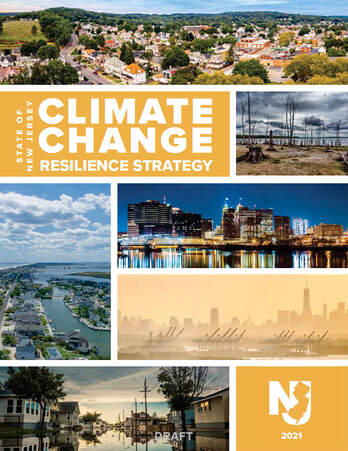 As the world’s nations debate and negotiate desperately needed responses to climate change, here in New Jersey, the Murphy Administration is moving forward on a plan to respond to the climate induced challenges we already face. Called “The State of New Jersey Climate Change Resilience Strategy,” the proposed plan aims to promote policies and strategies that recognize “New Jersey’s vulnerability to climate change cannot wait.” Challenges the state will face include sea level rise; increased storms, heat and rainfall; and the loss and reshaping of habitats and coastlines throughout the state. The resilience plan is complex and offers a series of interdependent responses to differing climate change impacts. It includes the results of surveys of the public asking about their top 6 concerns, as well as the actions and strategies they would like to see implemented by the state. The plan is upfront about the seriousness of climate change. It acknowledges: “New Jersey remains one of the most vulnerable states in the nation to damage from sea-level rise, storm surge, more frequent and intense precipitation, erosion and other climate impacts. The Littoral Society worked extensively with the state in development of the plan, participating in stakeholder meetings and providing comments, while also sharing expertise on coastal ecosystems, habitat restoration, and coastal policy. to support the Governor’s leadership on addressing the issue.
“The Littoral Society supports the Governor’s leadership in addressing the issue of climate change with a plan that recognizes the scope, severity and challenges posed to New Jersey,” said Tim Dillingham, the Society’s Executive Director. “The coastal portion of the plan recognizes the dynamic nature of our coastal areas and seeks to not only accommodate that nature, but affirmatively calls for investment in the protection, restoration and enhancement of coastal ecosystems.” The Society recognizes that the plan needs further development and that implementing it will present tremendous challenges. There will be fights over efforts to protect and restore our coast and prevent further poor development policies. However, unlike many other efforts to protect the coast, the ocean and environment themselves have a hand to play in forcing decisions. After all, the seas will still rise, the hurricanes will still come and things that we value at the coast – wildlife, beautiful open beaches and a robust “blue economy” – will be lost if we don’t act. Which is why we are heartened that Governor Murphy and his administration are making forward-looking plans to deal with the most urgent, and complex long-term threat facing the state and its residents. Comments are closed.
|
Archives
July 2024
Categories
All
|

